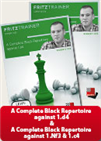Thrilling
 Press release
Press release
The second semifinal of the Leon Masters between Boris Gelfand and Andrey Esipenko was a thrilling affair. After a disastrous start with White, Gelfand won an excellent second game, which was followed by two draws.
The match was to be decided in two blitz games. Gelfand won the first game with Black and only needed a draw with White to reach the final, but Esipenko managed to create imbalances in the position and ended up levelling the score.
 These video courses feature a black repertoire against 1.d4, 1.Nf3 and 1.c4. The recommended variations are easy to learn and not difficult to remember, but also pose White serious challenges.
These video courses feature a black repertoire against 1.d4, 1.Nf3 and 1.c4. The recommended variations are easy to learn and not difficult to remember, but also pose White serious challenges.The match was thus decided in Armageddon: 6 minutes for Esipenko with White, and 5 minutes for Gelfand with Black, and White was obliged to win.
The Russian grandmaster came very close to doing so when he got into a technically won endgame, but the great Boris defended with great speed and energy and achieved an agonizing draw that qualifies him for the final against Vishy Anand.
Anand vs Gelfand, a rematch from the 2012 World Championship match!
Commentary by IM Sergio Estremera
Game 1
The first game between Gelfand and Esipenko had several twists and turns. A Nimzo-Indian was played in which White’s irregular treatment allowed Esipenko to equalize the position immediately. At that point, Gelfand mistakenly shifted his pieces to the queenside, allowing a devastating attack on his abandoned king.
When it seemed that the game would not reach move 30, White, with great ingenuity and some cooperation from his opponent, not only managed to survive, but at one point a mistake by Esipenko even gave him a chance to win the game. With very little time left, Gelfand did not hit the nail on the head and Esipenko regained the advantage, which he converted into a full point. A vibrant game.
Game 2
The Sicilian Defence was no surprise, since it has been Boris Gelfand’s favourite setup for more than 30 years. Esipenko prepared a surprising gambit in 5.b4, a daring novelty indeed.
Gelfand dealt with the surprise with aplomb and immediately found the weak points of the white idea, and it was the young Russian who very quickly began to face problems which he was unable to solve.
The white centre remained very static. With deep manoeuvres, which combined prophylaxis with blocking, Gelfand managed to tie up his opponent and finished him off in the most classic of styles. The spirit of Akiba Rubinstein has once again illuminated him!
Game 3
In the third game the equilibrium was not broken at any point. Gelfand and Esipenko followed up to a certain point what they had played in the first game, soon reaching an almost symmetrical position which led to massive simplifications.
After the exchanges it seemed that Gelfand could aspire to a certain advantage, but precise play by Esipenko, who gave up a pawn to activate his bishops, maintained the balance. A very technical game which ended in a draw.
Game 4
Esipenko once again played the Rossolimo System, against which Gelfand once again proved to be extremely well-prepared. The GM from Minsk played the first moves with great speed and energy — his tenth move was surprising for its complexity. Esipenko, despite the surprise, reacted appropriately, and the position remained in what we could call dynamic equilibrium.
When, after several exchanges, the endgame approached, Gelfand made an inaccuracy that could have cost him dearly, but his opponent, with little time on the clock, was not able to find the precise refutation. An endgame with opposite-coloured bishops appeared on the board, and the draw was inevitable.
Playoffs
Links


















 Press release
Press release




